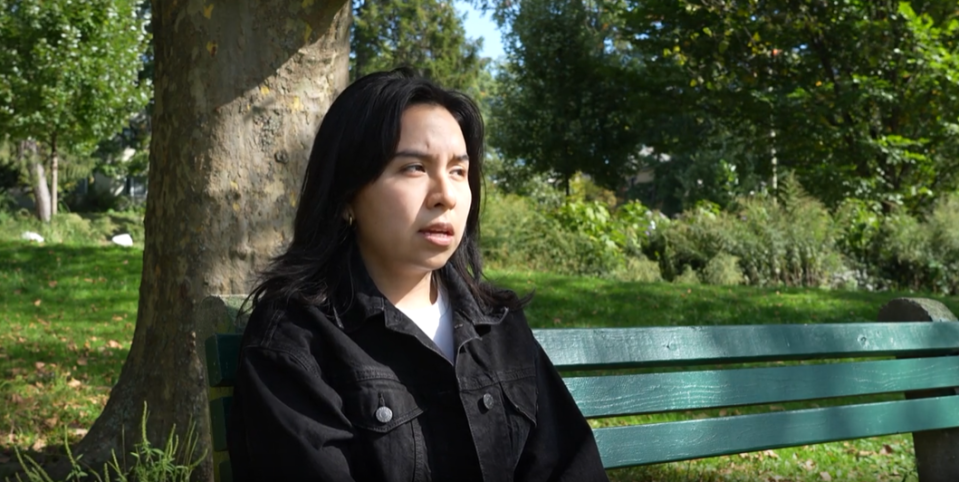North Jersey Dreamers pledge fight after Texas judge declares DACA illegal
- Oops!Something went wrong.Please try again later.
Erika Martinez was counseling New Jersey immigrants seeking the protections of DACA, the Deferred Action for Childhood Arrivals program, when the news broke last month: In the latest legal fight over the decade-old program, a federal judge in Texas had ruled it illegal — but stopped short of shutting it down.
For Martinez, 24, an organizer with the immigrant advocacy group Make the Road New Jersey, the ruling was a reminder of her tenuous status in this country.
The Elizabeth resident is anxious after the ruling, which is likely to be appealed. But she's also hopeful it may spur politicians to find a permanent solution.
"Would the end of the program be devastating? Absolutely," she said. "People would lose jobs, people would lose protection from deportation. But at the same time, there are other ways that we as community members can step up as well as elected officials and states."
"I try not to think of it as the end of the world," she added.

Martinez was brought by her family to the United States from El Salvador at the age of 2, one of thousands of "Dreamers" who grew up in America but still don't have certainty about their position here. In December 2021, she applied for DACA status, but she is still waiting for her application to be processed due to a backlog.
DACA was created in 2012 under then-President Barack Obama to afford protection against deportation and access to work permits to undocumented immigrants brought to the country as children, the group often known as Dreamers.
There were nearly 580,000 active DACA recipients in the country, according to the U.S. Citizenship and Immigration Services agency, as of March 2023. That includes more than 14,000 estimated living in New Jersey, the fifth-most of any state.
Martinez is still protected from deportation after being granted special immigrant juvenile status a few years ago. That federal program enables undocumented immigrant children who have suffered abuse, neglect or abandonment from a parent to get lawful permanent residence in the U.S.
Nevertheless, the end of DACA would be a blow she would feel personally, Martinez said. She knows many enrolled in DACA now and others who are trying to get its protections.
The program has been subject to legal and political attacks since its implementation. In February, nine Republican-led states sued the federal government, the Mexican American Legal Defense and Educational Fund, and the state of New Jersey to stop the DACA program, arguing that it was illegal and it "inflicted significant financial costs on the states."
New Jersey joined the lawsuit as a defendant in 2018, arguing that the state would suffer from the deportation of Dreamers who work jobs, attend schools and have otherwise been woven into local communities.
Is DACA still active?
In his ruling last month, U.S. District Judge Andrew Hanen agreed with the states and declared DACA illegal. But while he barred the government from approving new applicants, he left the program in place for those already covered.
More: Growing up undocumented, MSU graduate produces film based on her experiences
Critics, including the states that challenged it, say DACA forces taxpayers to shoulder the cost of social services for people who were in the country illegally.
"Congress, for any number of reasons, has decided not to pass DACA-like legislation," Hanen wrote in his ruling last month. "The executive branch cannot usurp the power bestowed on Congress by the Constitution — even to fill a void."
The Mexican American Legal Defense and Educational Fund said it plans to appeal the ruling.

One of the recipients, Passaic resident Isela Coyotecatl, 23, is also worried about what will happen if the program ends. She was brought to the U.S. from Mexico by her family at 2 years old. But at 16, with help from her mom, she was admitted into the program.
Coyotecatl (whose full name is Isela Estefany Coyotecatl Ricoy) fears that Dreamers will be forced to leave behind what they have established in their adopted country.
"DACA protects us from deportation. If that happens, everything that we have done here in this country would be lost. There is no foundation we had established in our [home] country," she said.
She plans to attend graduate school to study how higher education policy affects undocumented students. She hopes DACA will allow her to stay in the U.S. to continue her studies.
Coyotecatl said being in the DACA program changed her life, as it enabled her to get a job in her teens and attend Rutgers University-Newark, where she graduated last year. DACA also allowed her to get a Social Security number, which made it possible to receive financial aid.
“I honestly felt very relieved. I felt like I had all these dreams I wanted to pursue, but how can I if I can’t apply for financial aid?,” Coyotecatl said.
Hanen's ruling
The recent ruling left her disappointed but not surprised, because Hanen had ruled previously in 2021 that the program was illegal. She hopes the latest decision serves as a wake-up call for politicians in Washington to pass legislation such as the DREAM Act, which would enable DACA recipients and others brought into the country as minors to become permanent citizens.
"Nothing really changes until there's more pressure on Congress to act ... and we need to pressure our Congress [members] to act toward a more permanent solution," said Coyotecatl, who has protested for action with Make the Road New Jersey.
A few days after the September court ruling, Martinez, the organizer from Elizabeth, helped set up a virtual community call to bring recipients and advocates together to share their anger and fears, and to plan next steps in the fight for DACA to remain.
Martinez, who wants to work as an immigration lawyer in the future, said in an interview with NorthJersey.com that the court decision sets up a legal showdown over DACA on a larger stage: the U.S. Supreme Court.
Financial aid: Bergen County school gets $3M grant to help Hispanic students prepare for college
"What we see in the movement is that [Hanen] is kicking the can down the road. He doesn't want to be the one to have effectively shut the program and even invalidate all of the current work permits, " Martinez said. "His last decision will inevitably go into appeals. Then it will reach the Supreme Court in 2024 or 2025, and he wants them to make the decision to either shut down the program or reopen it."
Former President Donald Trump canceled the DACA program in 2017, but in a case decided by the Supreme Court three years later, a 5-4 majority said the Republican president didn't follow the law in ending the program. In that case, Chief Justice John Roberts joined with four liberal justices to allow the policy to continue.
But the make-up of the high court has since shifted: Conservatives now enjoy a 6-3 advantage, and four of them have already signaled they have deep reservations about DACA.
This article includes material from USA Today.
Ricardo Kaulessar covers race, immigration, and culture for NorthJersey.com. For unlimited access to the most important news from your local community, please subscribe or activate your digital account today.
Email: kaulessar@northjersey.com
Twitter: @ricardokaul
This article originally appeared on NorthJersey.com: These NJ Dreamers promise to fight after judge finds DACA illegal

